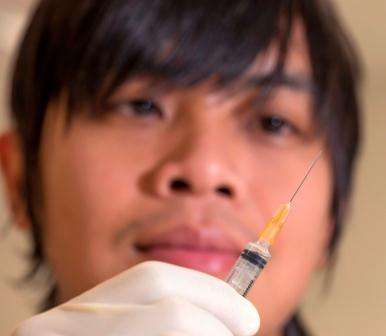Conquering the fear of needles

Flinders University Nursing student Ahmad Hasyim, an Indonesian who says the fear of needles is particularly strong back home, is fighting back against that fear through his Master's thesis, which explores why people don't inject enough, and how they can conquer their fear.
Mr Hasyim said his research showed that one of the reasons people don't inject is because they believe complications caused by not injecting are caused by injecting itself.
"People believe things like their grandmother has lost a leg because she injected too much insulin," he said. "The real reason is often the opposite, which is that she suffered complications because she didn't inject enough – perhaps because of her own fear.
"The reasons for this fear are complicated. Sometimes it's a fear of the needle, sometimes it's a fear of insulin, sometimes it's a combination of both, or something else entirely.
"The good news is that whatever the reason, there are very successful methods to help people conquer this fear and avoid the complications that come from it.
"My thesis looked at four methods successfully used by diabetes educators in Australia.
"The first is Desensitising, which helps people to overcome their anxiety about needles by letting them examine and play with the needles themselves.
"Once people have spent time doing this, sometimes even practising injecting with a saline solution, four out of five lose their fear.
"The second method is called Orientation Towards Reality, which focuses on the fear of insulin and educates people about what insulin really is and what it really does.
"Many people don't realise that it's a perfectly natural substance which occurs in the human body, and so they don't have to be afraid of it.
"The third method is Relaxation, which involves teaching people to use relaxation and breathing techniques while they inject to lower their stress levels.
"The fourth method is Creating a Safe and Supportive Learning Environment, which means we let people explore their issues in a positive way, avoiding any critical language and allowing them to assume their own responsibility for their care."
My Hasyim said that assuming responsibility for their own care was the cornerstone of good diabetes management for most sufferers.
"It's important to understand that treating diabetes effectively is not simply about medication," he said. "It's about suffers having a good lifestyle management and becoming an expert in monitoring their own blood glucose levels."
In September, Mr Hasyim will return to Indonesia, where he hopes his knowledge will be integrated into the Indonesian health care system.
"Australia's system of diabetes management is really excellent, and my research supports a similar approach in Indonesia," he said.
"It is my hope that my thesis can help influence Indonesia to follow the Australian example to improve the lives of Indonesian sufferers."
Mr Hasyim also has big plans for when he returns to his home town of Malang City in East Java.
"When I go home I would like to take my new knowledge and experience of holistic treatment, including lifestyle management, and one day establish a clinic that will allow me to personally deliver this kind of world class diabetes treatment for Indonesians," he said.

















